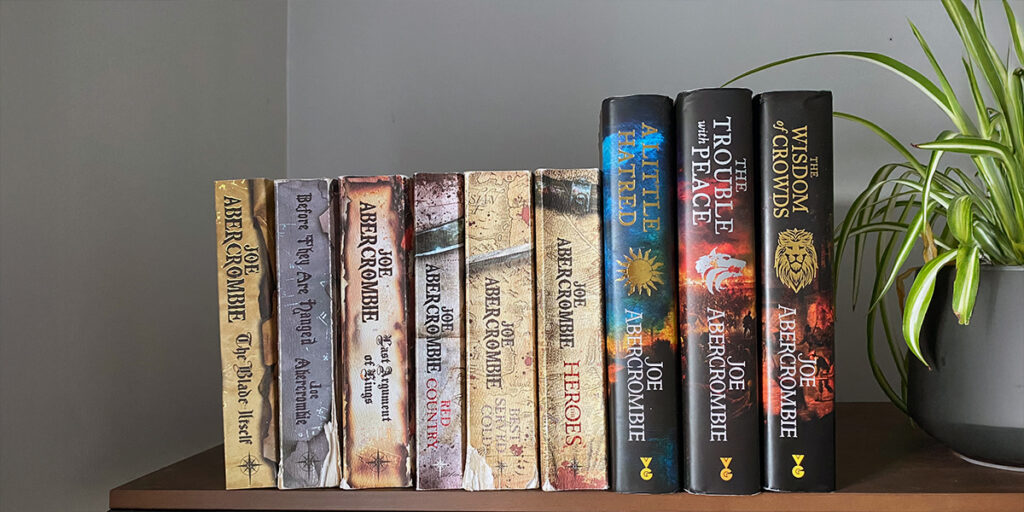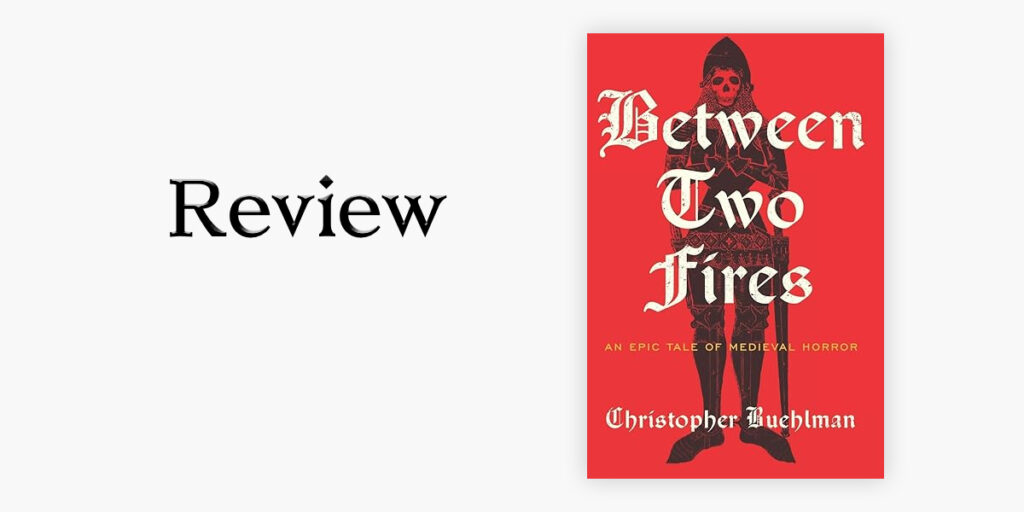Yes I’m doing another post where I rank a popular series. It might spark the ire of some of you, but it’s my blog and I’ll do what I like. I’m also on a Joe Abercrombie binge, having just recently read and reviewed The Devils. Having already ranked The Dark Tower series, this time I’m ranking Joe Abercrombie’s First Law series. For the purposes of this post I’ve included the original First Law trilogy, the three standalone novels and the Age of Madness trilogy but not the collection of short stories [Sharp Ends]).
Once again, this is your warning that there will be some light spoilers in this post. So, if these books are still on your TBR, you should stop reading this and—quite frankly—go start reading them instead.
I’ll start by saying that this was no easy task for me, because I think these books are all incredible.
But there’s no fun in putting them all up in first place, so—in ascending order, from my least favourite to the cream of the crop—here we go.
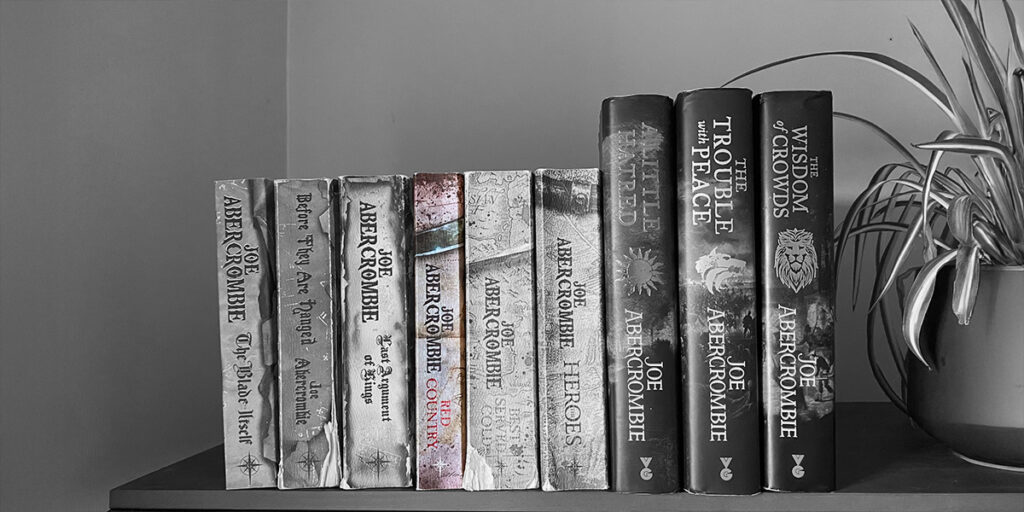
9th – Red Country
I hate seeing this book at the bottom of a list, because it’s a brilliant read — but for me it just doesn’t hit the same highs as the rest of the stories in the First Law world. Maybe because the main events of the book take place on the very frontier of the First Law world, so it’s quite literally on the outskirts. The story takes place in the borderlands and follows a ragtag band of misfits as they seek to carve out a new life for themselves.
This is last of Abercrombie’s standalone books in the series, but—much like the others—it features some recognisable characters in Nicomo Cosca (famed soldier of fortune) and a certain “Lamb” (cough cough, IYKYK) – but what makes it a great read is the new cast of characters. Shy South is a ferociously driven woman, Temple is a complicated coward, and Dab Sweet and his caravan full of companions are all great in their own unique way. Abercrombie’s strength is in his character work. And in Red Country, every single one of them is flawed and nuanced, complicated and messy. They feel rounded and inherently human.
Stylistically though, Red Country has a very wild-west feel to it, and it feels a bit too different from the rest of the books in the First Law world, so I’m putting it last in my rankings.
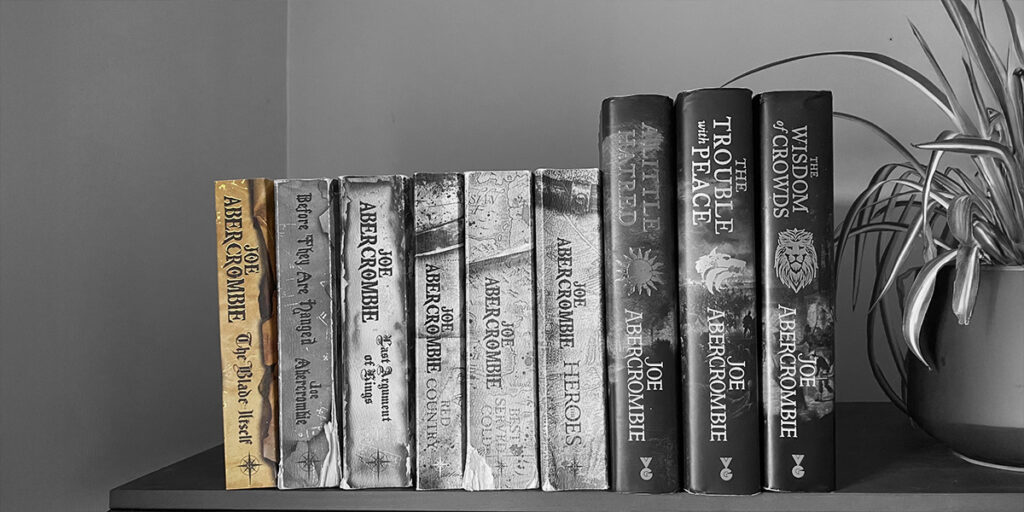
8th – The Blade Itself
The book that started it all. The Blade Itself is the first instalment of the First Law series, and we quickly get introduced to some of fantasy’s best-written characters. Logen Ninefingers (The Bloody Nine), Bayaz (First of the Magi), Jezal dan Luthar and—most memorable of them all—Sand dan Glokta, torture victim turned professional torturer for His Majesty’s Inquisition.
This book properly sets the tone for the First Law series in that it’s dark and brutal, but there is a grim sense of humour throughout. The shortcomings of every character are very apparent, and the various factions are introduced so seamlessly that you won’t even notice the world-building. From Rudd Threetrees and his cadre of Northmen going against the self-proclaimed King Bethod, through to the vengeful Ferro Maljinn and her hatred of the Gurkish Empire — we find ourselves immersed in a brilliant new fantasy world.
But the reason it’s low down on this list is the same reason that I’ve seen quite a few readers abandon this series at their first attempt — the story can feel like it meanders a little. Personally, I found myself enraptured by Glokta’s peril and Bayaz’ inherent mystery, but I did find myself a bit weighed down by Jezal dan Luthar’s chapters (although you start to understand exactly why we spend so much time with this character as the series progresses).
I can see why some readers didn’t quite gel with this book, but I always urge them to persevere. Because if they do, then they have an incredible journey ahead of them.
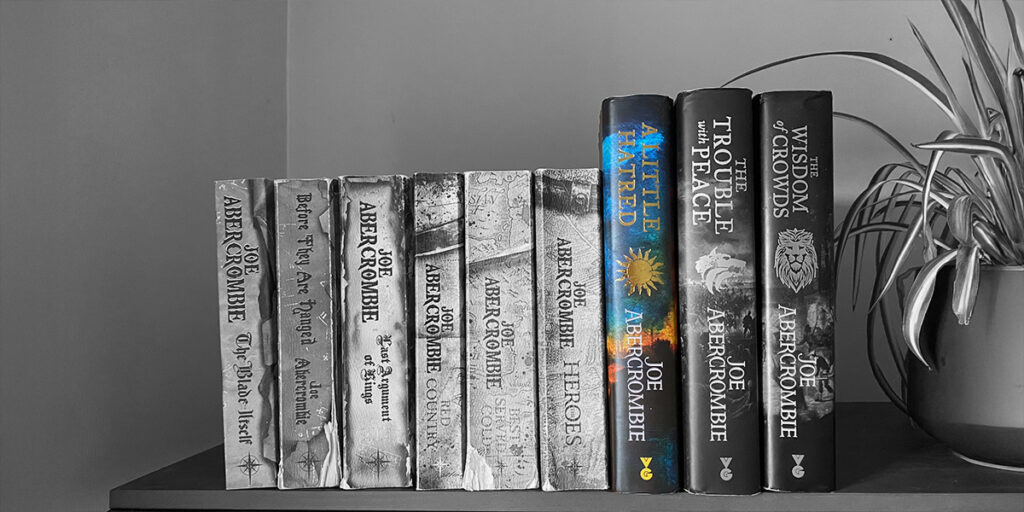
7th – A Little Hatred
We’re jumping ahead now to the first instalment in the Age of Madness trilogy (book 7 in the full series, in case you were wondering). A Little Hatred sees us take a bit of a time jump, and what I love about this trilogy (books 7-9) is that we see rapid developments shaping the entire structure of the civilisations in the First Law universe. Just like in real-life, where technological progress was relatively slow, until suddenly it wasn’t (think about the advances we’ve made in just this past century alone, compared with the thousands of years beforehand) the denizens of the Union find themselves facing a brave new world.
And these developments beget political upheaval, ideological conflicts and, of course, new ways to wage war (some of which were cleverly teased or foreshadowed in earlier books, which is another reason I love Joe Abercrombie’s writing).
A Little Hatred also demonstrates how much an author’s writing improves, the more that they do it. Don’t get me wrong, Joe Abercrombie was clearly talented when he penned The Blade Itself, but the writing in subsequent novels (including A Little Hatred) feels sharper, leaner and more impactful, without losing any of his distinctive voice.
But the reason this book is low down on my list is simple, if not a little unfair – it feels like a reintroduction (probably because it sort of is one). It’s still a phenomenal read, but it also serves the purpose of setting up the rest of the Age of Madness trilogy, which means it drops down the rankings a little.
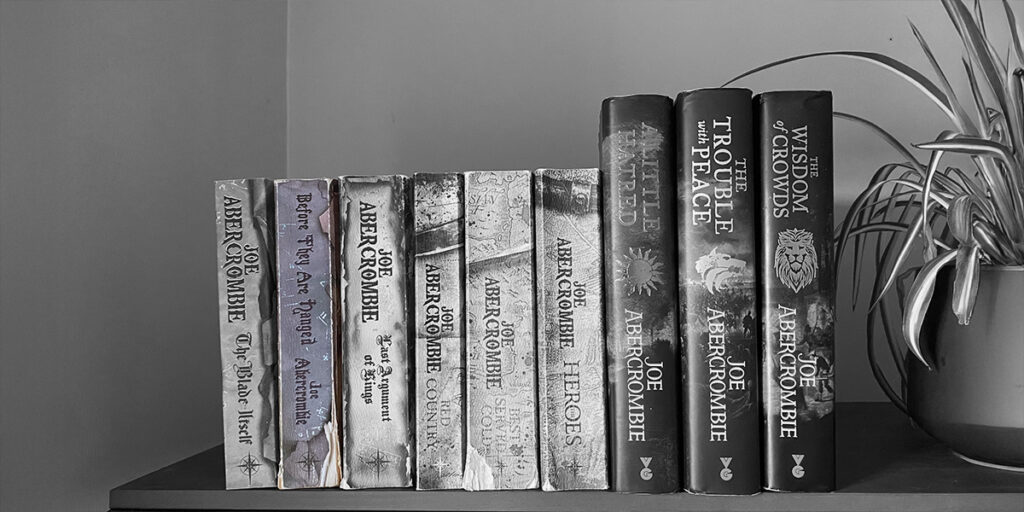
6th – Before They are Hanged
Book 2 in the original First Law trilogy (and book 2 in the grand scheme of things) is Before They are Hanged, and many of those same readers who only sort-of-enjoyed The Blade Itself credit this book as the reason that they continue with the series. And I can see why; it has some of the biggest and best set pieces and through-lines in the history of gritty fantasy fiction. A murder mystery playing out inside a city under siege, an incompetent royal blundering his army into a war in the frozen north, and an epic quest across a magic-induced wasteland to find a mysterious weapon of purported cataclysmic power. Phew.
We also get thrown into the thick of the action, as most of the main cast of characters are already known to us – and any new(ish) ones that get introduced are just as memorable (Nicomo Cosca, Carlot dan Eider make their debuts here) and just as hate-inducing (Crown Prince Ladisla, Arch Lector Sult also feature more prominently). The stories all move at breakneck speed and you quickly come to realise that you’re reading one of those rare “unputdownable” books.
That assessment alone should tell you how highly I rate this entire series, given that—despite all that praise—Before They are Hanged sits in 6th in terms of my favourite reads from it! There’s no negative reason that it’s this low in my rankings — I just think there are five even better reads ahead of it.
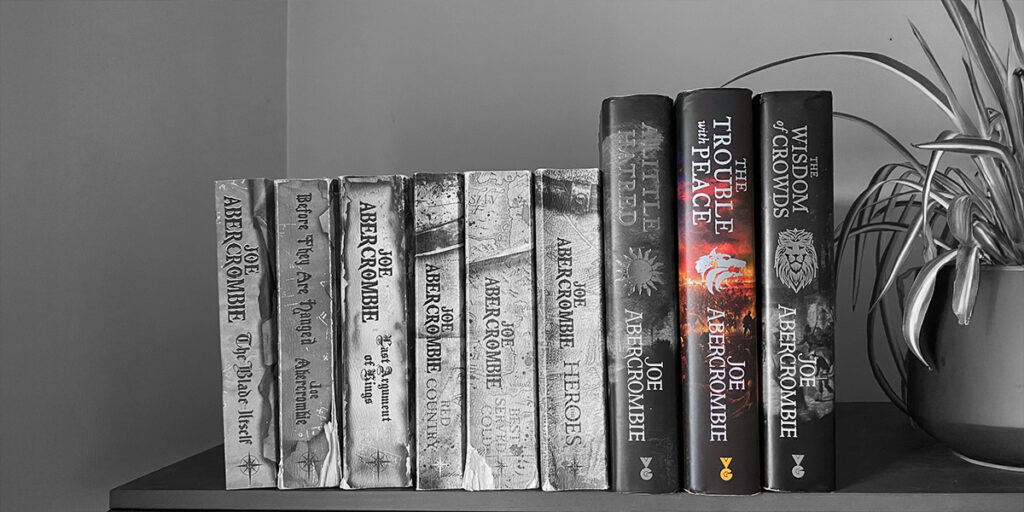
5th – The Trouble with Peace
Jumping forwards along the timeline again, we find The Trouble with Peace (Book 2 in the Age of Madness trilogy, book 8 overall) in fifth place. I tousled with this one as it could just as easily have sat as low as seventh in my rankings, but the writing and interweaving of so many characters, motivations and priorities clinched it a place higher up the list.
As both a reader and an author myself, I know firsthand just how skilled a writer you have to be in order to take multiple strands, character POVs, plots and subplots, and make them all work together in a way that feels both natural and compelling. The Trouble with Peace is, in my mind, an absolute masterclass in doing just that.
It’s also everything that book 2 in a trilogy should be. It’s a bridge between the events and developments of book 1, it’s a promise of even greater things in book 3, but it’s also a brilliantly-written and—most importantly—supremely enjoyable story in its own right!
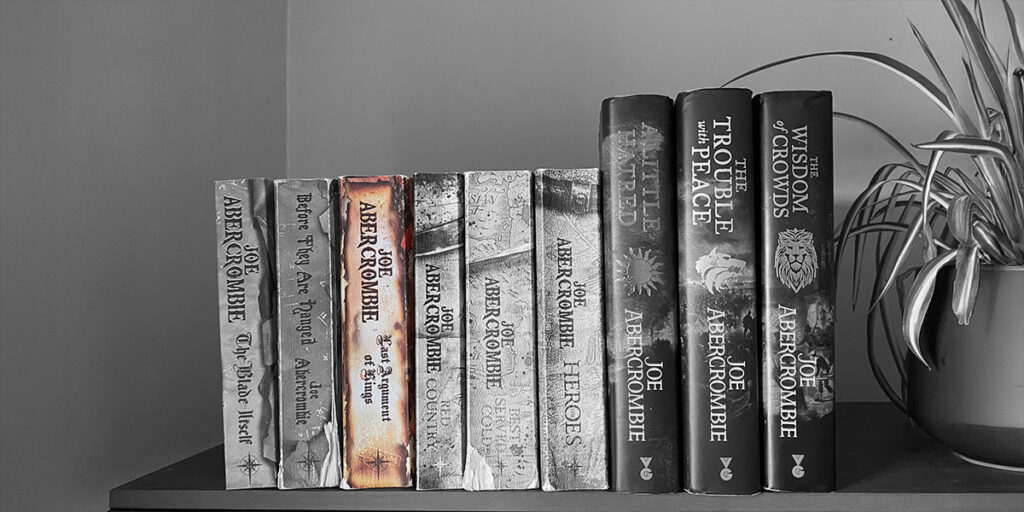
4th – Last Argument of Kings
Not gonna lie, we’re into the part of these rankings where each book is separated by a hair’s breadth at most. Positions up here are split by technicalities and nuanced personal preference, as opposed to any grand failings. Or any failings, if I’m being honest. Did I mention I love these books?
In fourth spot I’m sticking Last Argument of Kings – the epic finale to the original First Law trilogy. The culmination of the aforementioned impeccable character work, as almost everyone gets either a sublime comeuppance or a bittersweet ending that—for me at least—only two authors have so far managed to perfect; Joe Abercrombie and Stephen King.
This book is a masterpiece, and it’s actually a travesty that it’s only fourth on this list, as it wraps up so many dangling threads from its two predecessors, but it does so in a way that is just so damn pleasing. Suspicions that I had from reading the first two instalments were confirmed in brilliant style, and others were kiboshed entirely as totally unexpected endings erupted in their place, instead.
The First Law trilogy is rightly lauded far and wide, by Last Argument of Kings is the very definition of “sticking the landing.”
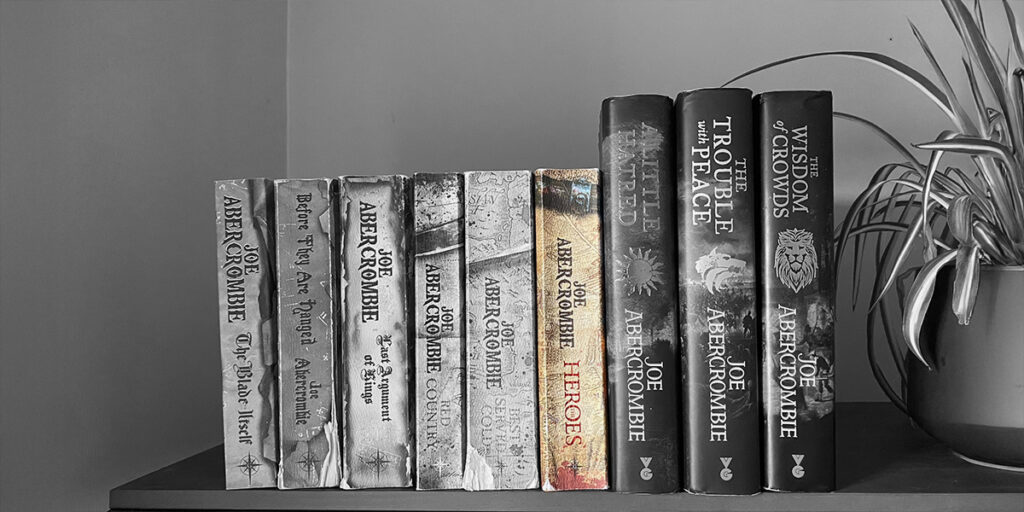
3rd – The Heroes
The second of the three standalone novels, The Heroes takes Joe Abercombie’s talent for weaving a massive—but deeply interconnected—world and…shrinks it down to a single battle. And you know what? It works spectacularly!
The story of this book happens over the course of just a few days, and centres entirely on a battlefield that contains ancient standing stones on a hilltop (the eponymous “heroes”) but, despite its seemingly limited scope, it covers so much ground.
We find ourselves navigating the ruthless politicking of the Northmen through the eyes of Curnden Craw, the “last honest man in the North” — and we feel the turmoil of disgraced swordsman Bremer dan Gorst (whose fall is captured almost as a sidebar in a previous novel). All of this is set against a huge military engagement that is equal parts brutal and bloody as it is laughable and pointless. The author’s ability to zoom in on individual characters, without losing the scale of the bloodletting or suffering around them, is second-to-none.
For such a seemingly self-contained story, it feels huge. And it fully deserves it’s place in my top three.
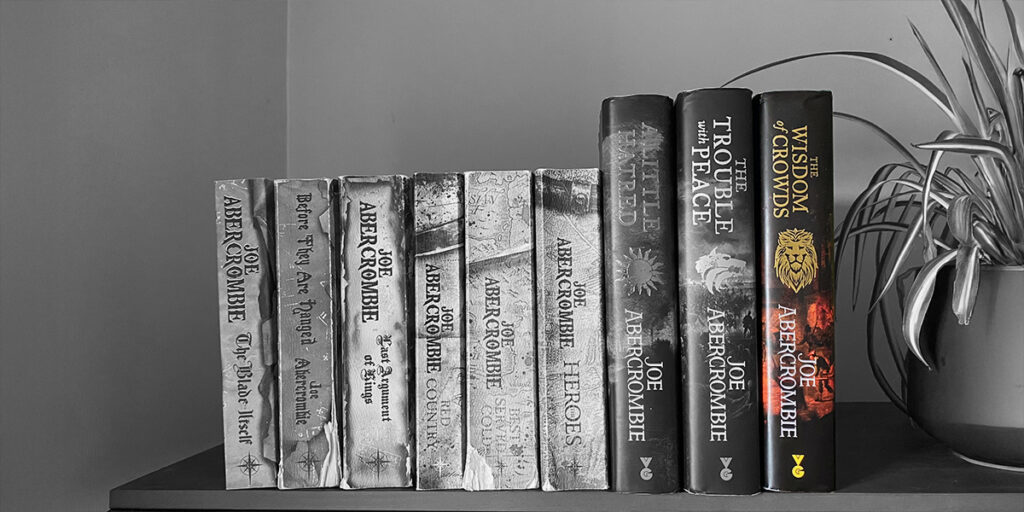
2nd – The Wisdom of Crowds
A somewhat controversial pick for second place (as most people I talk to seem surprised to find it so high on my list) – but The Wisdom of Crowds is the (current) endpoint of the entire First Law universe, and what I absolutely love about it is how well it is crafted as a story. Because, for me, this book does three, quite spectacular, things:
- It’s a great read – a brilliant book in its own right
- It’s a great ending to a trilogy – wrapping up all sorts of crazy schemes and machinations from the previous two entries
- It’s a great ending to a nine-book saga
And it’s the combination of these three things that make me rate it so highly.
Not only is it another fantastic, gritty fantasy read, but it’s a perfect finale to an intriguing trilogy set in a rapidly changing world. Most notably though, it serves as an absolutely incredible bookend to events and characters from the very first book in the entire series. Reaching back across decades, The Wisdom of Crowds serves up a brilliant twist that harkens back to the original book in the First Law universe, despite them being published fifteen years apart. There aren’t many series that can lay claim to doing that as well as this one does.
Read all nine, end on this one and just appreciate how magnificent the entire saga is.
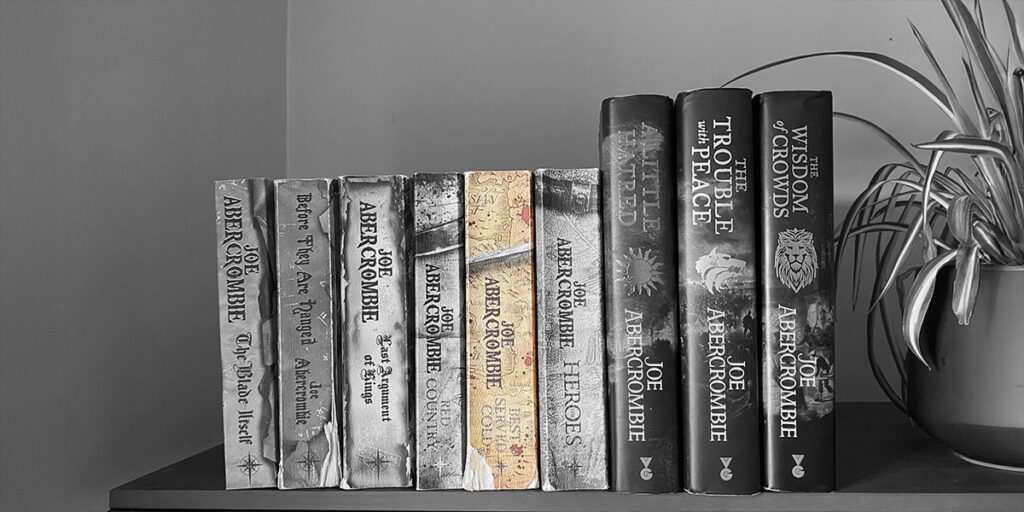
1st – Best Served Cold
This seems to be high, if not top, on a lot of peoples’ lists, and it’s very easy to see why. Best Served Cold is the first in the three standalone novels, and is actually set further afield than most of the other books, as we navigate the tricky dukedoms of Styria.
One of the best opening chapters ever written (and one of the best titled, too) sees our story of revenge kick off in brutal fashion. We then follow our protagonist, Monzcarro Murcatto, as she ruthlessly pursues her vengeance against those who betrayed her. Monza is a brilliantly written character, but so too is the band of misfits that she pulls together to complete her dark work. Nicomo Cosca is one of my First Law favourites, but the arc of Caul Shivers is a study in how to develop characters properly—and Shylo Vitari, Friendly, Morveer and his apprentice, Day, all make for an excellently assembled crew.
What follows is a litany of adventure and misadventure, including some epic and unforgettable scenes (one in particular is forever seared into my brain, pun very much intended). It’s a self-contained story and it’s so tightly written, but the exploits of it also stretch to mentions in other books in the series, which only serves to make this standalone feel more epic. It’s like a spin-off in a beloved movie universe, only unlike most spin-offs, this one is absolutely brilliant. In fact, think of it like the “Rogue One” of the Star Wars franchise. Self-contained and compelling in its own right, but ultimately connected and integral to the wider series.
And because it’s more self-contained than some of the other books, it makes it eminently re-readable, which is perhaps why it’s taken the number one spot in my rankings – because I rejoin Monza and her crew at least once a year. And they never disappoint.
Conclusions
I’ll keep this short and to the point – if you like your fantasy books dark and gritty, bloody and witty, you should read all of these. You should read them in order, and if you find yourself a little unsure after reading The Blade Itself, just stick it out until at least the end of Before They are Hanged – you won’t regret it.
And, once you’ve read them all, come and argue with me about why this list isn’t in the right order. I know for a fact that we’re not all going to agree on exactly which book ranks where.
After all, you’ve got to be realistic about these things.
📚✌🏻SP
Share this post
Steve Pannett is an author and designer based in Yorkshire, UK.
He writes primarily in the fantasy genre, combining character-led storytelling with epic, gritty world-building to create dark tales with plenty of action and lots of twists along the way.
He has self-published multiple books and is active online.
